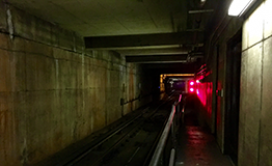FTA Releases WMATA Stop Signal Overrun Investigation Report and Issues Safety Directive to Correct Systemic Safety Deficiencies
WASHINGTON – The U.S. Department of Transportation’s (DOT) Federal Transit Administration (FTA) today issued a Safety Directive 16-5 to the Washington Metropolitan Area Transit Authority (WMATA) requiring the transit agency to address the serious safety concern of stop signal overruns in its Metrorail system by implementing 11 required actions and expediting completion of prior corrective actions approved by FTA.
The Safety Directive is based on six significant findings set out in a Stop Signal Overrun Investigation Report also released today. The report includes findings from FTA’s spring 2016 “Safety Blitz” assessment of Metrorail and states that, although WMATA has taken steps to prevent stop signal overruns, the agency can do more to identify and mitigate the systemic deficiencies and operational concerns that allow these events to occur.
“WMATA has taken many of the steps that DOT has required to improve safety,” said U.S. Transportation Secretary Anthony Foxx. “However, until there are no stop signal overruns, WMATA can, and must, do more. The FTA new required actions will help reduce the likelihood of future occurrences and keep Metrorail passengers and workers safer.”
The FTA initiated this investigation because: in 2015, the Metrorail system had more stop signal overruns than in either of the previous two years; the FTA’s review of individual stop signal overrun incidents since it assumed direct oversight responsibility in October 2015 identified potential issues that required system-wide analysis and evaluation; and a near-miss collision at Smithsonian Station on February 3, 2016, highlighted the potential catastrophic consequences associated with these events. The investigation was conducted from March to July 2016.
“The FTA acknowledges WMATA’s commitment to reducing the frequency of stop signal overrun incidents, but it must do better to prevent such incidents and improve its investigation process in order to develop more effective risk-mitigation measures,” said FTA Acting Administrator Carolyn Flowers.
The FTA found that WMATA experienced 68 stop signal overruns between January 1, 2012 and July 31, 2016, or an average of 1.24 stop signal overruns per month. These events occurred at all times of day, throughout the year, by both new and veteran passenger train and rail maintenance machine operators, on all types of track and at locations across the Metrorail system.
The FTA investigation focused on four main areas: determining the frequency of stop signal overruns on the Metrorail system, identifying the potential consequences of these events, clarifying contributing factors to these events, and assessing the adequacy of WMATA’s actions and programs currently underway to prevent these incidents.
The safety findings detailed in the report address three key areas of concern: a lack of WMATA train operator familiarity with mainline and yard territory, train operator inattention or confusion when departing from a station or terminal or moving under zero speed commands, and deficient communications between the train operator and the Rail Operations Control Center. FTA also agrees with a previous stop signal overrun assessment conducted by WMATA in 2014, which found that pressures placed on train operators to maintain schedule for operational reasons may cause or contribute to these events.
Since the FTA issued its Safety Management Inspection report in June 2015, and under the FTA’s direct safety oversight since October 2015, WMATA has taken of number of critical steps to address the underlying causes that contribute to stop signal overruns. For example, WMATA has revised key operating rules, expanded training for train operators and rail traffic controllers, improved adherence to radio protocol, and investigated options for modifying the signal system to automatically stop trains at red signals, even when operating in manual modes.
However, the FTA finds that WMATA must increase its efforts to prevent stop signal overruns beyond those steps already taken. Additionally, the FTA intends to work with WMATA to review, revise and expedite completion of pre-existing corrective actions as appropriate to ensure that WMATA continues to make timely progress towards meeting its safety improvement goals and fulfilling FTA’s requirements.
As directed by Safety Directive 16-5, WMATA must develop corrective action plans to address the new findings of the report and related required actions. WMATA’s proposed corrective action plans are subject to FTA approval, and FTA will monitor the agency’s progress to implement the safety improvements.
FTA can enforce the required actions through a number of means, including the withholding of Federal financial assistance from WMATA, directing WMATA to use Federal financial assistance to correct safety deficiencies, and mandating restrictions or prohibitions on Metrorail operations (such as imposing speed restrictions or shutting down some or all system operations) to abate a substantial safety risk.
The report and Safety Directive are the latest actions taken by FTA as it provides temporary and direct oversight of WMATA Metrorail and the transit agency’s efforts to improve safety and bring the Metrorail system into a state of good repair.

